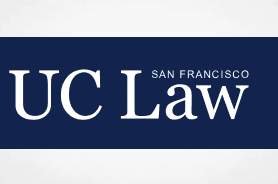At UC Law San Francisco, student organizations allow aspiring attorneys to connect with like-minded peers, build their professional networks, and pursue their passions.
UC Law student Julie Mendoza ’25 did just that when she established and became president of the law school’s new Education and Law Society this past fall. Mendoza explains why she launched this organization to focus on an issue she is particularly passionate about — education equity.
Q: What is the Education and Law Society?
A: The Education and Law Society (EdLS)’s mission is to build a coalition of attorneys, educators, and community leaders committed to education equity. We also aim to create legal career pathways to organizations dedicated to dismantling systemic barriers to education. Additionally, we connect law students with practicing attorneys working at the intersection of education and law. It’s been a privilege collaborating with other law students in pursuit of these goals.
Q: Why did you found this organization?
A: I decided to create EdLS in response to the problems I observed as a public school educator in East Oakland. In my four years in the classroom, I witnessed the decline of literacy rates following distance learning, racially inequitable school closures, and a growing teacher shortage in core subjects. If left unaddressed, the harm from these issues will continue to worsen and potentially take generations to reverse. For these reasons, improving public education must be a priority for anyone invested in our future as a nation.
Q: What opportunities does EdLS offer students?
A: Beyond professional development, we also provide law students with pro bono opportunities through the Law Empowerment and Access Program (LEAP), for which I serve as the Lesson Planning Chair. LEAP was founded by UC Law SF student Tussanee Reedboon ’24. It aims to empower youth by inviting law students to provide legal workshops in middle and high schools across the Bay Area. Demystifying the law and exposing youth to law school pathways are important steps toward making the legal field more diverse. Facilitating a “Know Your Rights” workshop at the school where I served as a seventh-grade English teacher was the highlight of my 1L year.
Q: Why are you so passionate about education equity?
A: Growing up in a low-income, single-parent household, I attended a dozen K-12 public schools in the Bay Area. While being constantly uprooted was difficult, reading and access to books helped me exercise my imagination wherever I went. It was an essential part of my personal growth and development as a student and provided me with the tools to envision and pursue different worlds, paths, and ways of life. However, similar opportunities for youth are becoming diminished, particularly for low-income youth of color.
In 2022, Oakland Unified School District voted to close or merge nearly a dozen schools. Among the impacted students, 93% were either low-income, English language learners, or foster youth, according to KQED. A report released by California Attorney General Rob Bonta’s office this year stated that the closures would have “disproportionately impacted Black and low-income elementary school students and also high-needs students with disabilities.” Moreover, the effect of closing a neighborhood school is felt for generations. With my legal training, I intend to investigate decisions that disproportionately harm historically disempowered communities and defend access to a free and equitable education.
Q: How is this organization advancing your career goals?
A: One of my goals as a future attorney is to make fighting for educational equity an enduring part of my practice. Through EdLS and LEAP, I’ve been able to set the groundwork to meet this goal. Not only has it provided me with invaluable leadership experience but also a community of inspiring and like-minded peers who I can call on for future projects.
For more information on EdLS or to volunteer with LEAP, email [email protected].





